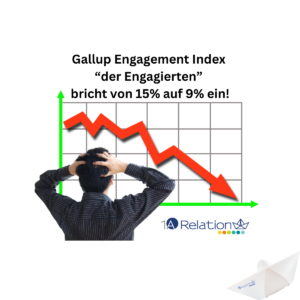On Zeit Online I found this long but very interesting article. In the broadest sense, it is about self-knowledge of customer orientation or self-assessment. Above all – from our point of view – how do you assess your own behavior towards the prospect/customer? How customer-oriented are you or your company really?
Although the article does not specifically focus on customer orientation, it shows with many examples how difficult it is to draw a halfway realistic self-portrait. And the questions and theses he puts forward have a lot to do with corporate and personnel management. How do I work? What do I trigger in the other? Do I overestimate myself or my company and its performance?
An example from the article:
“Dunning and Kruger had given their subjects a series of tasks from IQ tests and let them estimate how well they were doing. As it turned out, the top 25 percent of the participants assessed their performance quite realistically; often they even underestimated themselves a little. The worst quarter, on the other hand, had a far exaggerated idea of their own abilities. Are bragging and failure therefore two sides of the same coin?”
A second example on another topic:
“According to an influential theory, our tendency to self-deception is a byproduct of trying to assert ourselves against others. Because in order to be convincing, we first have to be convinced ourselves; we have to believe in the bear we tie up to others – at least that helps.
Firstly, this is supported by the observation that successful manipulators are indeed often very self-absorbed. Good salespeople, for example, can exude enthusiasm; conversely, procrastinators and doubters have little chance of bewitching others.”
Why am I mentioning this?
Very often, managing directors are asked in studies “how customer-oriented they are” or “how good they are on the path of digital transformation”. Anyone who has read the article knows how much value these statements have. Not a big one. Unfortunately. This is also confirmed by an analysis by Gartner. Quote from the document: “Gartner has projected that 80% of companies believe they deliver a superior customer experience, but only 8% of their customers agree.” Although I am always a bit cautious with Gartner studies.
More details at the end of this document in the integrated PDF or here the link to it.
Self-awareness of customer orientation
So try to get a halfway objective picture of your customer orientation. An external view by customers and consultants, employee survey, a customer panel, NPS – there are many possibilities. A criterion that is often forgotten: the data and address quality.
Anyone who undergoes this objective examination (especially regularly) gets a fright after the 1st insight into the results. But a salutary one. Customer orientation begins with the data and addresses. It doesn’t require psychology to do this. Data and address quality can be measured directly and objectively.
Read the article first and then answer the next survey or renew your self-assessment! 🙂
To the article by Zeit Online:
How well do you know each other? Probably worse than you think, say psychologists. It would have many advantages to change that.
— Read more www.zeit.de/wissen/2018-07/selbsterkenntnis-psychologie-forschung/komplettansicht
Also interesting: How companies achieve better customer orientation
In an exciting written PDF, there is a statement from Gartner: 80% of the companies surveyed consider themselves customer-oriented. But only 8% of the customers of these companies. Well, that’s a gap that is wide.
Click to access The_Customer_Journey_Maturity_Curve_Usermind.pdf
Note: This is a machine translation. It is neither 100% complete nor 100% correct. We can therefore not guarantee the result.












